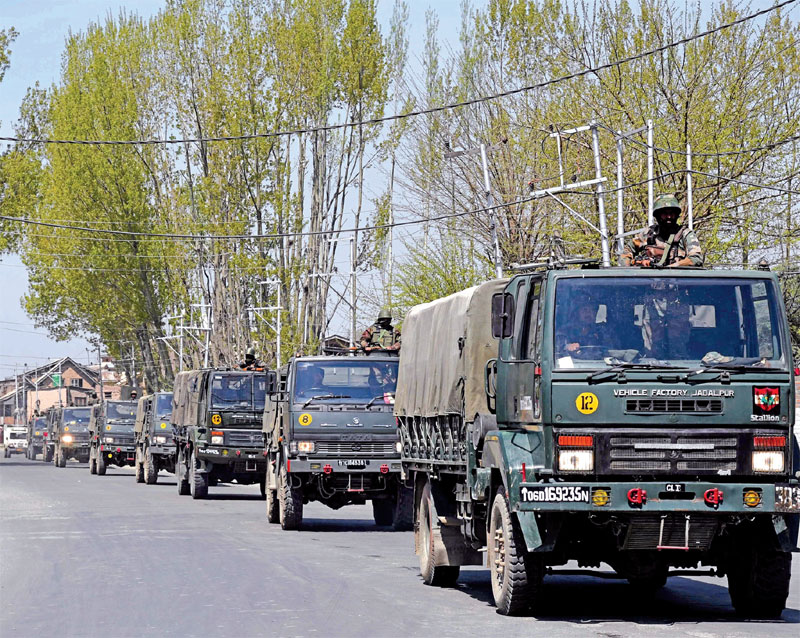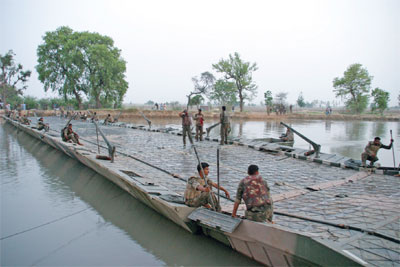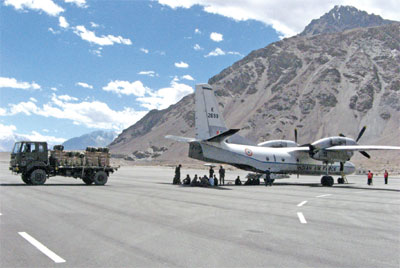Proper logistics, supply chain management essential to maintain morale of troops in remote areas
 Brig. Ravi Palsokar (retd)
Brig. Ravi Palsokar (retd)
‘My logisticians are a humourless lot… they know if my campaign fails, they are the first ones I will slay.’ This quote has been attributed to Alexander the Great, and in various similar forms to many others. Another popular quote, ‘Amateurs talk strategy, professionals talk logistics’ has been attributed to a range of military leaders from Napoleon Bonaparte to Gen. Omar N. Bradley of the US Army during the Second World War. Whatever the truth, it only serves to emphasise the importance of administration and logistics in war and even more so in counter-insurgency wars. These could be within the country or in out of area operations.
There was a time not very long ago when administration meant the same as logistics. However, with modern management science being applied to global supply chain management, the two are now considered separately. Put simply, administration is defined as the duties assumed in conducting logistics and the direction of that effort, whereas logistics is defined as the procurement, supply, maintenance and transportation of equipment, provision of facilities and personnel. A more relevant interpretation for our conditions would place procurement as part of administration and thus we could define the two together as the process of planning, implementing and controlling the efficient, effective flow and storage of goods, services and related management, from their point of origin to the point of consumption.
Purists might call this nit-picking, but the fact remains that all campaigns depend upon the smooth flow of men, materiel and means of sustenance to the fighting troops. It becomes even more important in remote areas or during counter-insurgency operations where a large section of the local population may be hostile or at best indifferent and uncooperative. These difficulties get compounded in out of area operations in conditions such as the IPKF in Sri Lanka. Frontline troops have little time to devote to managing logistics and when things go wrong, as they often will, it becomes imperative that they are provided with the wherewithal to continue operations without looking over their shoulders. This is easier said than done because unlike operations where the results are immediate and visible, the ill-effects of poor logistics may often take time to manifest. It then becomes all-important to plan and implement administration and logistics before troops are committed to action.

Administration of Troops
Provisioning: Our troops have to operate over different types of terrain along the length of the border. In recent years Indian soldiers have had to conduct counter-insurgency operations, mainly in Kashmir as well as many parts of the northeast. The existing infrastructure, though it is being improved, can range from good to indifferent with various levels of development in between. Add to this the weather, which in the northern and north-eastern reaches of the country, can range from snow, rain and persistent inclement conditions. Often, weather conditions restrict supply operations to six months in a year, as in Kashmir. Watch how winter stocking is done in J&K and Ladakh.
Over a period of time, the refined supply chain works like the beat of a metronome; with the convoys starting from the plains and staging through various transit camps to their destination, where the bulk is broken and supply is made to frontline troops with forward posts being stocked for the coming winter months. Any disruption, and the causes for this can be many, may result in monotonous supply of tinned rations. The troops who are cut-off for months at a time will benefit by variety, which is denied to them for want of supervision. This author has vivid memories of surviving over long periods of time on tinned potatoes for vegetables and mango slices in over-sweet syrup. Admittedly, those were days when helicopter supplies were unthinkable, but even in Sri Lanka supplies were unimaginative and sub standard.
Placement of Provisions: A large army such as ours has diverse responsibilities over the length of the border regions. The placement of provisions becomes critical. Take the Northeast as an example. North Bengal serves Sikkim and is a gateway to the Northeast. The area leading to the narrow corridor leading eastward becomes a natural administrative node. It also sits astride a major elephant transit corridor. Leave aside the normal problems of storage, security and distribution, the authorities have to deal with the depredation of the pachyderms. Supply depots have orders to open the gates and doors of storage sheds so that foraging elephants can access what they want to eat such as dal and sugar.

Recently, a big tusker got separated from the herd and in a fit of rage attacked everything in his path, including the commanding general’s residence wall. Amusement aside, such damage has to be catered to and no amount of planning and preparation can take into account such contingencies.
The same problems apply to all stores required to be supplied. Pre-positioning of reserves of ration and maintenance material, including clothing at all levels, is the key. It is expensive and wasteful but there is no alternative, at least for the present.
Transportation: The movement of vehicle convoys during the stocking season has already been noted. What is needed is improved infrastructure to take heavily loaded lorries. Given the still developing infrastructure, there is a need to break bulk and load different types of transport depending upon the local road conditions. Aerial resupply can only be done as a stop-gap or in an emergency. The once ever-dependable mule is now being phased out but transportation of whatever kind to inaccessible areas still remains an area of concern.
Apply this to a counter-insurgency sector and the problems of security become critical. Protection of convoys by picquetting roads can and is being done, but it is manpower intensive.
Transit arrangements: All forward areas need to have transit arrangements, and these consist of camps for personnel moving into and out of the operational area. Convoy drivers have to rest, be provided food and sanitation and vehicles require maintenance. Where such a system has been in existence over a period of time, problems have been overcome and the process is quite smooth. Difficulties arise in counter-insurgency areas when new inductions take place. Manning of transit camps, responsibility, administrative arrangements and security need careful thought and implementation. It is not enough to delegate responsibility to lower units and formations who are often involved in operations. Such arrangements should be the responsibility of the highest administrative headquarters and this is usually the command headquarters. Area headquarters are well suited to take on this task.
My own memory of transit camps inducting troops of the IPKF in Sri Lanka is of disorganisation at every level. Field formations operating on the Island had been delegated the responsibility of setting up their own camps. Their primary task was elsewhere and as a result the camps were characterised by inefficiency. In such a negative environment, rumours became the normal passage of information in turn leading to despondency among those entering what was admittedly a very difficult operational area. There was no control, no attempt to share information and keep transients occupied. Those going on leave shunned such camps but those entering had no choice. Overall, it was a poor show. The lesson is that troops being inducted into a battle zone need careful handling. It is a different story when a unit gets inducted because their command and control structure takes care of such problems. It is when disparate groups get together, usually after leave or other duties, that they need soldierly and sensitive handling.
Discipline and ethics: These are important aspects of a soldier’s life and more so during counter-insurgency operations. Countering insurgency is done to assist the civil authorities to re-establish law and order and the Armed Forces Special Powers Act was promulgated to help the military in this objective. The law gives legal protection to the troops so that they can carry out their duties, including the use of force, without looking over their shoulders. The provisions of this Act are draconian and over a period of time there have been calls to remove it from most areas because either the necessity has ceased to exist or there has been an odd case of abuse of its powers.
In the last few years, the government has lifted the AFSPA from most areas of the northeast and it remains in force only in a few selected districts where armed insurgency persists. This is how it should be. Troops have to be trained to maintain their discipline in the face of grave provocation and enforcement has to be very strict. There are always complaints against the army—now mercifully reducing—for excessive use of force or breach of discipline. A cursory glance over published figures shows that over 95 per cent of the complaints are bogus and motivated. In the balance five per cent, the army itself has taken disciplinary action without being prompted.
However, recent events show that it is not enough to take action, it has to be adequately publicised. Perception management and civil opinion are as important as action in counter-insurgency. Ethical behaviour by troops should be a given and they have to be made constantly aware of their duties and responsibilities. Fortunately, the Indian jawan is inherently disciplined and god-fearing, but even so it is essential that this important aspect of discipline is not overlooked.
Morale: Rightfully, this is a separate subject by itself. Good logistical support helps commanders in maintaining morale. Undoubtedly, this is a major operational responsibility for every commander at every level. It also is the responsibility of the administration that conditions are created so that operational efficiency is not impacted by poor delivery of supply and services. One example should suffice. Troops operating away from bases are very much dependent on portable battery-based communications.
In Sri Lanka, we found that we were continuously supplied with batteries that were past their useful date and had to be changed frequently. They created an unnecessary load and also were difficult to dispose, so a column operating in the jungle left a tell-tale trail behind it. Instead of improving matters, my formation was asked to explain why the usage of batteries was so heavy and wasteful. It required intervention at a senior level to bring the matter to an end, but it was an unnecessary imposition. The point is that no field commander can do his task unfettered unless he is backed by steady and regular delivery of services such as ration, clothing and means of sustenance, including postal services. Mobile phones may be ubiquitous, but our border areas are still hampered by poor or no connectivity. It is unnecessary to dwell on the ill-effects of such a situation. Repeating, the entire gamut of administration and logistics impinges on morale and fighting ability of troops.

Logistics
Logistics may be defined as the last mile delivery of various administrative services which have been discussed, and we need to look at some specific issues that fall under the domain of operations logistics. These matter even more for troops engaged in counter-insurgency operations which are often conducted in remote areas and have paucity of facilities.
Supplies: Ration supplies are of two types, perishable and non-perishable. In service terms they are called fresh and dry ration respectively. Dry ration comprises items such as rice and flour, lentils, cooking oil and condiments. These can be supplied in bulk and stored for extended periods of time. They are supplied at regular intervals, may be fortnightly or monthly, with bulk breaking taking place at various supply depots in the chain of command.
Fresh ration consists of perishables such as vegetables, fruits, milk and meat. The last can also be delivered as live animals (meat on hoof), but this is costly, problematic for transportation as well as consumption. Tinned substitutes are an obvious answer, but these are unpopular for their monotony and taste. The stocking for winters in remote border areas has already been mentioned. The delivery is made by the Army Service Corps (and they are very good at it). It must be remembered that spoilage can take place due to delay in delivery because of disruption of communication as also inclement weather. The supply of fresh ration to remote forward areas is a sensitive task and attention is required to ensure regular and timely deliveries.
Clothing and Stores: Troops in operations, whether conventional or otherwise, have to be equipped according to terrain and weather conditions. Continuous usage causes wear and tear and repair facilities are hard to come by. This necessitates provision of additional supply of clothing, more than what the normal lifecycle recommends and this in turn requires financial regularisation. Forward troops expect this to be taken care of and it is the duty of the staff at various levels to take care of this. An administrative system that is not nimble enough to cover such contingencies can cause unnecessary hardship to troops. This adds to the cost of provisioning and supply and audit authorities have to be co-opted in the process.
Ammunition: There has to be regular and uninterrupted supply of ammunition. It involves both stocking and replenishment at various levels. This is a subject by itself and the security of forward stocked ammunition needs careful attention as enemy action can cause great damage.
Ancillary Services: Providing for convoys carrying soldiers and stores to and from the front-line, necessary repairs, maintenance, food, shelter, hygiene facilities are essential part of logistics support. These are noticed only when there is a breakdown. Even today we hear of losing soldiers because a vehicle has gone off the road during inclement weather; or that a soldier has lost his life before adequate medical intervention could be made available. There has to be a better way to do this and administrative staff has to be alive to such problems rather than fixing matters when they break down.
Planning Essential
Administration and logistics encompass all military operations and is a command function. Its lacunae come to the fore when there is a breakdown. Sufficient planning and foresight can take care of most problems and the concerned staff have to be alive to such requirements. It is no wonder that two and half millennia ago, Alexander the Great had cause to remark on this “humourless science.” Modern commanders would do well to heed his concern.

